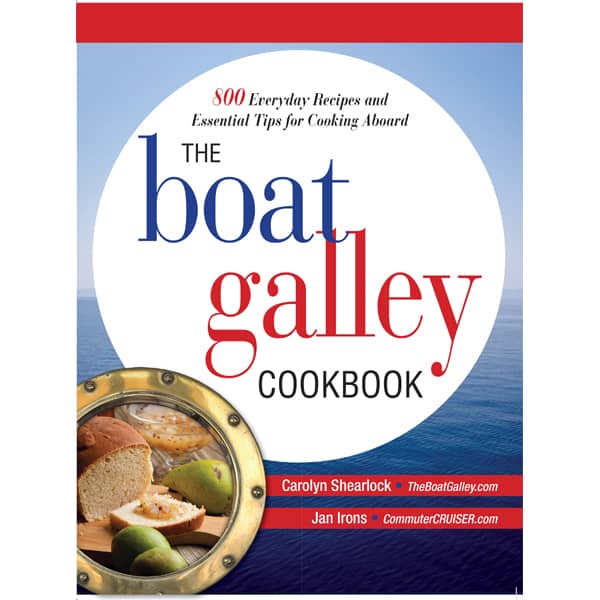I’ve gotten a couple of questions about storing butter and cheese on a boat while cruising. When we were coastal cruising, I never went longer than a month without reprovisioning. We generally provisioned every two to three weeks. But as the cheese selection was limited in some of the places we visited, I have stored cheddar for 5 or 6 months at a time. As the majority of cruising boats have refrigeration, I’ll first discuss long-term storage of cheese and butter with refrigeration. Then II’ll share some options if you don’t have refrigeration.
With Refrigeration
Even with refrigeration, you need to take some precautions to store butter and cheese longer than a week. Butter (and margarine, too — I’ll refer to both together as “butter”) will pick up flavors and odors the longer its stored. And cheese will mold if not properly handled.
Butter
Any butter that won’t be used in the next week should be double-bagged in heavy-duty Ziploc bags. Get as much air out as you can. Or vacuum seal it. This will really help protect it against picking up tastes from other things in the refrigerator. I put just one or two sticks in each package (particularly if vaccuum-sealing). Then I could easily take out a little at a time.
I usually put my entire stock (except what I’m currently using) into a plastic container with a tight lid (see food storage supplies). Then I tucked it into an out-of the way spot in the refrigerator — the colder the better. I’ve kept butter this way for as long as three months when I’ve found a particularly good price.
Note that I used olive oil and canola oil in place of butter in a lot of my cooking. So I reduced the amount of butter in the refrigerator. See reducing food in the refrigerator for more information. It’s also healthier!
The stick(s) that I’m currently using I put in a Lock & Lock plastic container (Amazon) I just use a small rectangular box out of the set I have. The Rubbermaid Lock-It boxes (Amazon) also do a good job of protecting against odors.
Cheese
I basically store in the same way. If it comes commercially packed, I leave it in its wrapper and put Ziplocs or a vacuum sealed bag over that. If it’s been cut from a larger piece, I wipe the piece well with white vinegar. You can use other types of vinegar but they may leave a bit of a taste. And make sure it’s dry before putting it in a Ziploc or vacuum sealed bag. I also put these in a larger plastic box for long-term storage. I keep opened cheese blocks in their own tightly-lidded plastic boxes.
If hard cheeses develop a little mold, you can just cut it off and wipe the remaining part with vinegar.
Cream cheese will keep for up to 6 weeks if you vacuum seal the blocks individually. Keep it in foil but take it out of its box). Using Ziplocs instead of vacuum sealing it, I’ve kept it 3 to 4 weeks before it developed mold.
Cottage cheese, ricotta and other very moist cheeses can generally be stored unopened for a week or even sometimes two if they came in a sealed plastic carton (the kind with plastic film or foil over the top). I’ve never had much luck with storing them longer, or storing very long once they were open. I’ve tried turning the carton upside down, as has been suggested in many places, but it just hasn’t done anything for me.
Without a Refrigerator
In cool weather, you can often store cheese and butter in the bilge or other cool area of the boat for a month or more. Just follow the techniques above. If you do this, be sure to put them in a high-quality plastic box with a tight-fitting lid. That way, nothing — bilge water or bugs — gets in. In the tropics — or even summer in the US midwest or south — it’s harder:
Butter
I’ve heard that in some locations you can get canned butter, particularly in the South Pacific. I have never seen it anywhere that I’ve been and have no experience with it. I’ve found it for sale a couple of places in the US (Amazon carries canned butter now) — a can contains the equivalent of three sticks of butter and costs $6 plus postage (Dec 2010). The manufacturer says it has a 3-year shelf life unopened. If you’ve used it, please relate your experience in the comments.
Otherwise, regular stick butter will last a week or so without refrigeration when the temperature is over 80 degrees. Be sure to store it in a tightly lidded plastic container as it will be very soft and will leak out of a Ziploc or a typical butter package.
Fellow cruisers have also recommended storing butter in a butter bell (Amazon). They report they can keep butter on the counter in one for up to 3 weeks. Just remember to change the water daily.
And, while I haven’t tried it myself, some cruisers also swear by freeze dried butter (Amazon). Just add water to rehydrate it and it’s ready to use. If you have experience with it, please share in the comments.
Hard Cheeses
These will keep well when encased in wax and then vacuum sealed, put in Ziplocs or wrapped in aluminum foil can be store maybe a month in hot weather according to some friends. The longest I’ve even tried to keep cheese without refrigeration has been a week, so I’m not an expert. The one thing that I do know is that the harder the cheese, the longer it will last.
UPDATE — Kim from Jack Tar Magazine says, “I can say from experience that unopened, plastic-encased solid cheddar can last over a MONTH without refrigeration in Mexico. It gets oily, but that isn’t a huge problem. I have lived many months in hot climates sans refrigeration. Most people would be surprised at how many things do not need it.”
As with butter, you can find canned cheese in some locations. And it has a very long shelf life before it’s opened. Here in the US, Amazon carries a couple of brands of canned cheese. When I looked, each can contained about a half pound. It’s not cheap, but if you’re headed on a long voyage in hot weather, it may be worthwhile.
Another, less expensive, option is cheese powder. No, you can’t nibble on a piece like you would a piece of cheese. But you can use it to make cheese sauces and macaroni and cheese.
With a Freezer Onboard
When we started cruising, few cruisers we met had freezers on board. But thanks to efficient stand alone freezers like the Engel 12 volt freezer (Amazon) and advances in power generation for boats, freezers are more common.
If you’re lucky enough to have one on board, you can keep cheese and butter in it long term. Cut large blocks into small sizes that you will use up quickly before freezing. Or, like one cruiser suggested to me, use a grater to take only as much of a frozen stick of butter as you need for a single use.
If cheese freezes, it will be more “crumbly,” but otherwise fine to eat.
Hopefully you now have some good ideas for storing butter and cheese on your boat. Let us know in the comments your favorite method.
Related Posts

Carolyn Shearlock has lived aboard full-time for 17 years, splitting her time between a Tayana 37 monohull and a Gemini 105 catamaran. She’s cruised over 14,000 miles, from Pacific Mexico and Central America to Florida and the Bahamas, gaining firsthand experience with the joys and challenges of life on the water.
Through The Boat Galley, Carolyn has helped thousands of people explore, prepare for, and enjoy life afloat. She shares her expertise as an instructor at Cruisers University, in leading boating publications, and through her bestselling book, The Boat Galley Cookbook. She is passionate about helping others embark on their liveaboard journey—making life on the water simpler, safer, and more enjoyable.
Simplify meal prep on board with proven strategies for provisioning, maximizing fridge space, and cooking delicious meals aboard your boat.










Carolyn Shearlock says
Dave —
I’d never heard of a “butter bell” until I got your note. If anyone else wants more info, I found the web site for it:
Butter Bell Crocks by L. Tremain
The same company (as well as several others) sell them on Amazon, where it gets rave reviews:
Butter Bell on Amazon
Jeremy Pierce says
You can make your own butter bell instead of buying.
I take a half pint jar and fill it with butter and submerge it upside down inside of a bigger bowl I have with water in it.
Be inventive with what you got…The concept is all that matters
Louise says
That’s very useful information, thank you!
Carolyn Shearlock says
I don’t have first hand experience with either — Dave’s recommendation of the Butter Bell is somewhat similar to submerging it in brine (although you use freshwater in the bell) — and I’ve heard of submerging cheese in oil, but never done it. With butter, I’d think it would somewhat depend on where you are and what the climate is like. If it’s too hot, the butter is just going to melt and mix with the brine.
-Carolyn
Carolyn Shearlock says
I haven’t used one, but Dave Skolnick (see his comment above) does. He’s a very experienced cruiser (a director of Seven Seas Cruisers Assoc) and also a delivery captain, so I trust his recommendation.
Ben (s/v CHRISTEL) says
Cheese, according to Lin Pardey;
place the pieces in a container and filled with a
best EXTRA VIRGIN OLIVE OIL.
Jeremy says
I store butter in a salt brine down in the cellar for 3-4 months before a bit of mold starts to form on it. No harm though, just lightly scrape it off. It will keep probably from mid fall through spring this way.
I use a 4TB salt to 1 Quart water brine, wide mouth jar + lid, and 1 Lb of butter… fits snuggly and holds itself down under the water level. I find that the butter doesn’t take on a salty taste and it sort of “dries it out”…almost makes it harder I guess is the best way to describe it. Just let it set at room temperature to make it spreadable.
Excellent alternative to freezer storage if you have a cool dark place to keep it. Kroger had a sale and I bought about 10-15 lbs back in Oct. Cellar temps ranged from mid 50s in the fall to right now about 35-40. You might increase the salt to preserve better, but I hate to waste the salt when its not totally necessary for its preservation in my case. But for the summer, since the cellar gets warmer, I would probably drop it down a well or cistern to help keep it
Carolyn Shearlock says
I doubt this will work for boats in the tropics, but if you’re in the high latitudes this might work in the bilge. Just be sure to use really watertight containers in case any bilge water gets on the containers!
Rob says
I agree with Tara on the use of Ghee. It can be found in many stores, but not inexpensive. A couple of cans or jars of Ghee will last a long time before opened and once opened it will last for a month or more in a container that is airtight. Tastes great and is better for those that have a lactose issue. If you make it yourself and have a FoodSaver get the vacuum fixture for mason jars – with air gone you could store for a year. I haven’t tested the Ghee, but 2 years ago I brought some Macadamia nuts back from a visit to Australia and put some in a mason jar and vacuum sealed it. Opened them last weekend and they were as fresh as they were 2 years ago. For another cooking oil consider coconut oil, it has a great flavor and is healthful. It also stores well in an airtight container.
WRT cheese – the more aged the better, but not all cheeses fit into this group and lots of people like different cheeses. We buy 2 year old aged cheddar and I seal it in a FoodSave bag and put it in the bilge. I forgot a brick in our bilge and when I was doing some maint. found it 3 months later – opened it up and cut a piece and it tasted as good as the one we just bought. OK now full disclosure – we are in the Puget Sound area and have a “cool” climate, so a South Pacific sailor may not have the same results. I also grew up in Pakistan, India and Thailand and we used Ghee in Pakistan and India and it lasted for quite a while in that climate un-refrigerated.